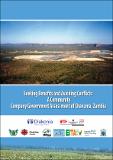Seeking Benefits and Avoiding Conflicts: A Community Company Government Assessment of Chavuma, Zambia

View/
Date
2016-12-30Author
Jesuit Centre for Theological Reflection
Type
Technical ReportLanguage
enItem Usage Stats
41
views
views
73
downloads
downloads
Abstract
This chapter is developed to lay out how the data required to meet the objectives of this study was collected.
The main goal of this chapter is to justify the methodological approach, validity and ethical considerations
that were undertaken during the CCGA process. Information included in this chapter is on the research design,
methodology and processes of data collection and analysis. As such, this chapter’s discussion will focus on the
various techniques and processes that were used to gather and analyze data as to achieve the main purpose
of the CCGA process. The research team prioritized Chavuma district to assess how relationships were developing among communities, local government authorities and the mining companies that were undertaking explorations. This provided a good opportunity for the CCGA to assess how relationships were unfolding during the pre-extraction period. The data collection process, validation and analysis for the CCGA was done from 29 November to 9 December 2016. The research team met with a wide variety of community and government representatives during the process with the exception of the exploring mining company Anglo-American Corporation (AAC).
Description
The CCGA explored the relationship among exploring companies, government and the communities by
assessing and measuring how it has and developed over time. Data is collected and analyzed using grounded
theory, a qualitative research approach which begins with generative questions that guide the research but are
not limited or confining. Thus, as data is gathered, core concepts and themes are identified, coded and linkages
are developed. A central feature of this approach is that the respondents themselves and not the researchers
identify the important themes that emerge in the study. The interview is carried out more in the form of a
conversation with the respondent selecting the topics to discuss, and, with probing, the respondent provides
the detail and depth to the topics discussed.